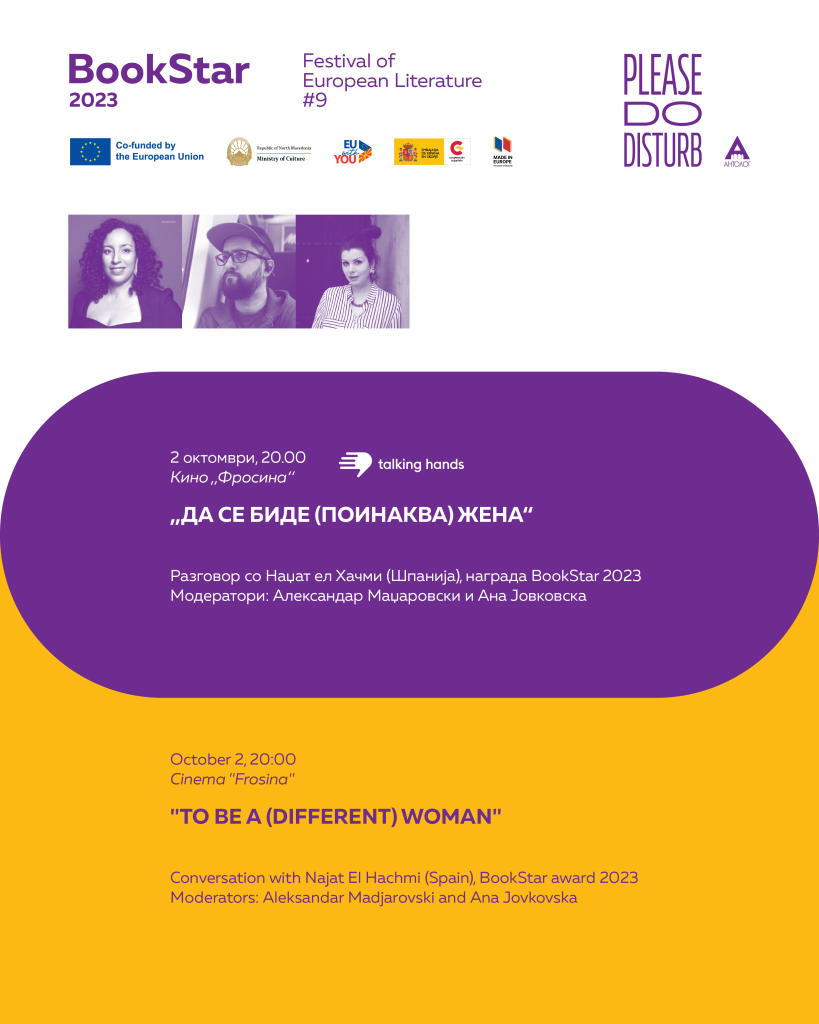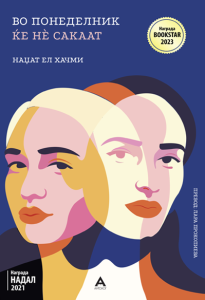
Presentation of the "BookStar" 2023 award to Najat El Hachmi (Spain) for the novel "On Monday They Will Love Us"
Conversation with Najat El Hachmi (Spain), BookStar award 2023
Decision of the editorial board of "Аntolog":
"On Monday They Will Love Us" by Najat el Hachmi was published simultaneously in Catalan and in Spanish in 2021 and exactly two years later it appears in Macedonian translated by Lara Prokopieva. It previously won the 77th "Nadal" award, the oldest literary award in Spain which is awarded for the best unpublished novel in the Spanish language, and in October 2023 it rightfully receives the "BookStar" award for the most significant novel published in Macedonia between two festival editions.
Writing today is not just about creating a story to connect with through the invisible strings of reading. Writing today with credibility means to present one's community from a perspective that is avoided, but also to try to reconfigure our broader society. True literature is no longer satisfied with just a style (technê) to be mastered, nor with any meaning and/or knowledge (epistêmê) to be conveyed, but necessarily comes into direct conflict with general and generalizing worldviews (doxa) in the historical and geographical context in order to establish perspectives for new value principles.
 "On Monday They Will Love Us" can be called a feminist novel, a novel for shedding light on the position of women in conservative environments, a novel about the search for freedom, a novel about the power of writing, about the (mis)comprehension of others, about the search for love, empathy, acceptance, belonging, but it is above all – a model novel of our time.
"On Monday They Will Love Us" can be called a feminist novel, a novel for shedding light on the position of women in conservative environments, a novel about the search for freedom, a novel about the power of writing, about the (mis)comprehension of others, about the search for love, empathy, acceptance, belonging, but it is above all – a model novel of our time.
Najat El Hachmi created a manuscript that without compromises and without self-censorship speaks about traumas, about the personal identity odyssey, about the tragedy of displacement, uprootedness, transience and disorientation. This feeling is associated with migrants, that is, those who have left one culture to settle in another. This settling most often only denotes a spatial notion, as migrants continue to practice the traditions of their native community, almost as if they never left. But among them there are always people who yearn to completely leave their origin behind and consciously or unconsciously accept the label. If they can at all break away from the constraints of the culture that pulls them back, the question is whether they can even be accepted beyond stereotypes, beyond expectations and prejudices, into the culture they aspire to? That's what makes this novel so meaningful and so close to us here who grew up with the motto "The East written us off, the West doesn't enroll us." Or, in El Hachmi's words, it sounds like this: "Precisely for this reason, the weight in my chest didn't disappear, because I couldn't feel free among those who claimed to be ours, yet, among others, I was completely invisible."
The feeling of schism, of confusion, of (non)belonging to the two communities, the two cultures that exist side by side, is probably the biggest identity and personal challenge that a person can experience. And in that whole process, Naïma (or Najat) enters with the belief that writing, that literature is the bridge that can connect the two shores. "I was convinced that I could learn what life was through books, love, sex, freedom." Interestingly, it should be noted that the manuscript was submitted for the Nadal prize under the working title "Intrusive" and under a pseudonym that seems typically Spanish - Cristina López . In such a way, El Hachmi turns into a kind of trickster, a mythical hero of today who, with the power of mimicry, manages to convey his powerful and significant story about a (Muslim by origin) woman who aspires to start a new life according to the European model. Her literary letter to the unnamed friend who is the catalyst of the cultural initiation they experience can be compared in significance probably to Mariama Bâ's "So Long a Letter", but at the same time, it is so authentic.
Being a woman fighting for her otherness simultaneously on two fronts – in the middle of the Moorish ghetto and in the middle of her new Spanish environment is a road-minefield. But Najat (or Naïma) is the one who accepts to go that way, ready to give up everything, only not the last thing – hope, not knowing if the Monday they want will ever arrive, the Mondey when they will love them?
With this novel, El Hachmi inscribes her name in the history of Catalan, Spanish, Moroccan, but also in the history of European and world literature as a name we will yet hear about. It is due above all to her approach through which the rights of different, rejected, humiliated, silenced and invisible women are treated. That approach is authentic, because it is personal and because it is sought in direct conflict with generalizing worldviews that want to see the world in black and white. Her disturbing novel is a breaking of that paradigm, and from it all the colors of the spectrum spill out.
Skopje, September 2023
Moderators: Aleksandar Madjarovski and Ana Jovkovska






